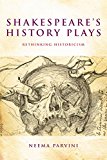
Shakespeare's History Plays: Rethinking Historicism PDF
Preview Shakespeare's History Plays: Rethinking Historicism
Uploader's note: This pdf was personally stringed up by me from what I had access to on JSTOR (which was all of this book). I used pdf editing programs to compile the pdfs together and remove information pages added to all Jstor pdfs for easier reading.
Boldly moves criticism of Shakespeare's history plays beyond anti-humanist theoretical approaches
This important intervention in the critical and theoretical discourse of Shakespeare studies summarises, evaluates and ultimately calls time on the mode of criticism that has prevailed in Shakespeare studies over the past thirty years. It heralds a new, more dynamic way of reading Shakespeare as a supremely intelligent and creative political thinker, whose history plays address and illuminate the very questions with which cultural historicists have been so preoccupied since the 1980s. In providing bold and original readings of the first and second tetralogies ( Henry VI, Richard III, Richard II and Henry IV, Parts 1 & 2), the book reignites old debates and re-energises recent bids to humanise Shakespeare and to restore agency to the individual in the critical readings of his plays.
Key Features
- Re-evaluates the legacy of new historicism and cultural materialism and intervenes in vital theoretical debates about human nature, the relationship between the individual and society, and the scope for individual political agency
- Questions the anti-essentialist, anti-humanist theoretical framework that has held sway in Shakespeare studies since the 1980s and develops a critical practice which appreciates Shakespeare's startling insights into personal agency in history and ideology
- Provides original new readings of the first and second tetralogies that demonstrate Shakespeare's unique and radical take on the workings of power, history, and individual agency
